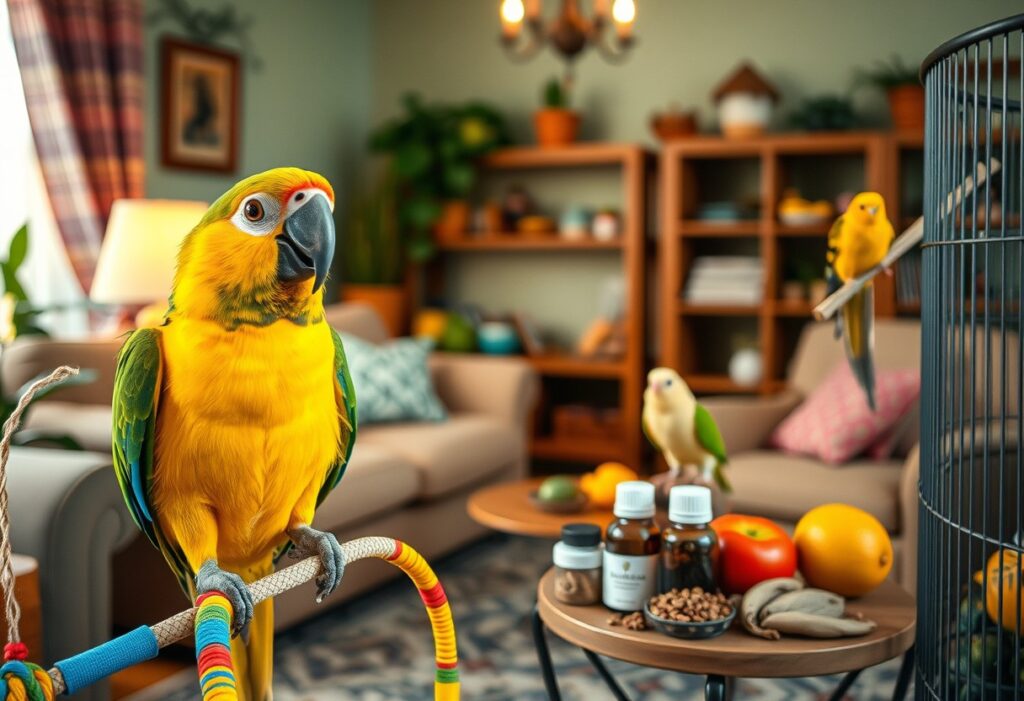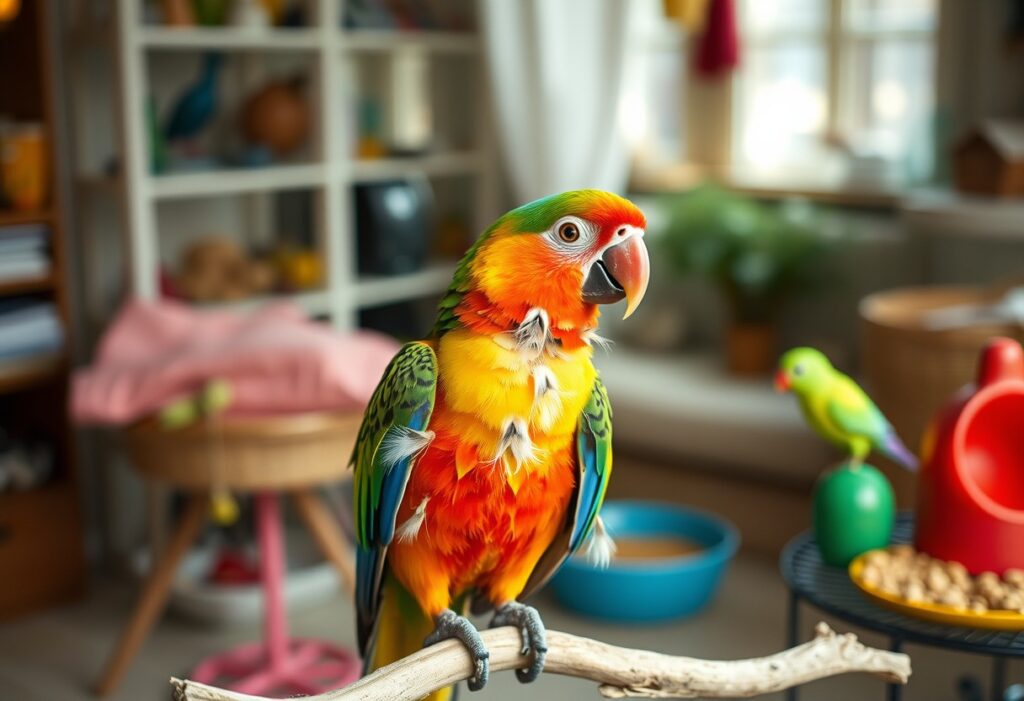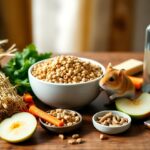It’s necessary for you to be aware of how to address common health issues that your feathered friends may encounter. From respiratory infections to feather plucking, birds can face various challenges that may impact their well-being. By utilizing natural remedies, you can not only promote healing but also ensure your birds thrive in a safe and healthy environment. In this blog post, you will discover effective, holistic approaches to help your birds recover from ailments without relying on harsh chemicals or medications.
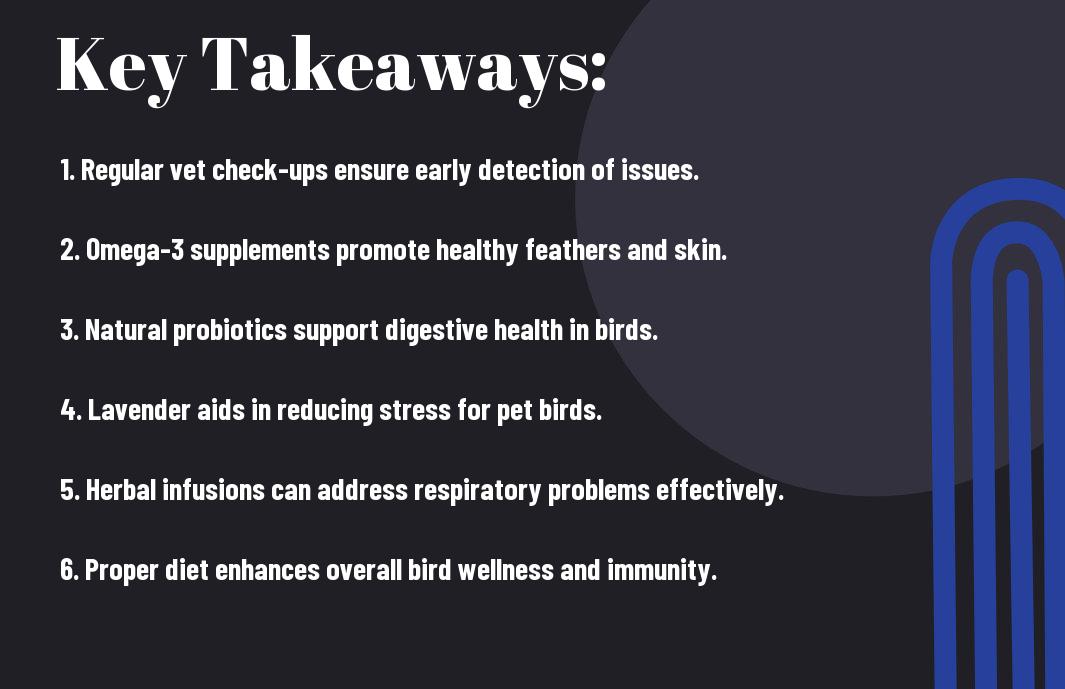
Understanding Common Bird Health Issues
For bird owners, recognizing health issues early can mean the difference between a quick recovery and a serious problem. Adopting a proactive stance toward understanding bird health will ensure your feathery friends lead long and happy lives. Familiarizing yourself with the signs of common ailments and being attentive to their behaviors can help you quickly identify potential health concerns.
Recognizing Symptoms
To ensure the well-being of your birds, it’s crucial to recognize symptoms of illness early on. Common signs of distress can include lethargy, changes in vocalization, reduced appetite, or unusual droppings. If you notice any behavioral changes, you should remain observant and keep track of any additional symptoms that may arise. Prompt action can make a significant difference.
To effectively monitor your birds’ health, you might consider keeping a journal to track any mood or behavior changes. This approach allows you to easily convey information to a veterinarian, should the need arise. Your vigilance can greatly enhance the quality of care you provide and can help ensure your birds remain as healthy as possible.
Types of Common Ailments
To enhance your understanding of potential health threats, it is helpful to familiarize yourself with some of the most prevalent ailments that can affect your feathered companions. Respiratory infections, feather plucking, and gastrointestinal issues are just a few examples that can arise. While some conditions may be minor and treatable at home, others may require veterinary intervention.
| Ailment Type | Common Symptoms |
|---|---|
| Respiratory Infections | Sneezing, nasal discharge, and coughing |
| Feather Plucking | Loss of feathers, skin irritation |
| Gastrointestinal Issues | Diarrhea, vomiting, changes in droppings |
| Obesity | Lethargy, difficulty flying |
| Abnormal Behavior | Aggression or withdrawal |
The earlier you can detect these symptoms, the better chance you have at providing effective care. It’s important to remember that when symptoms flare up, seeking immediate help can often lead to a better prognosis. Also, good husbandry and appropriate diet can prevent many of these ailments. Ensure your bird receives a balanced diet, adequate exercise, and a clean living environment. Thou, ultimately, should foster an environment that promotes your birds’ health.
More on Types of Common Ailments
The potential common ailments that birds face can encompass various issues, from dietary problems to environmental stressors. It’s crucial to understand that a combination of factors might contribute to these issues. For instance, a change in temperature or humidity can exacerbate existing health problems or lead to new ones. Additionally, some birds may be more prone to particular ailments based on their species.
| Ailment Type | Recommended Action |
|---|---|
| Respiratory Infections | Consult a vet and provide fresh air |
| Feather Plucking | Identify triggers and reduce stress |
| Gastrointestinal Issues | Change diet to nutritious options |
| Obesity | Increase exercise and dietary restrictions |
| Abnormal Behavior | Monitor interactions and environment |
Thou must always remain vigilant about your birds’ behaviors and surroundings to safeguard their well-being. Knowledge is power, and by learning how to identify and address common health issues promptly, you will ensure a healthier, happier life for your avian companions.

The Best Natural Remedies for Feather Issues
Now, when it comes to feather issues in birds, understanding the underlying causes is imperative for effective treatment. Birds may face feather problems due to various reasons, including nutritional deficiencies, environmental stressors, or even parasites. Fortunately, there are notable natural remedies that can help you ensure your feathered friend maintains healthy plumage. Here we investigate into two key areas: natural conditioners and dietary solutions that can aid in the restoration and maintenance of your bird’s feather health.
Natural Conditioners
Natural conditioners can make a significant difference in the quality and appearance of your bird’s feathers. These conditioners can be derived from gentle, natural ingredients such as aloe vera, coconut oil, and vitamin E. Regularly applying aloe vera gel can not only enhance feather shine but also provide a soothing effect on your bird’s skin, reducing dryness and irritation. Similarly, a small amount of coconut oil can be massaged onto your bird’s feathers for moisture retention, which helps prevent them from becoming brittle and breaking.
Additionally, incorporating natural conditioners into your bird’s grooming routine can facilitate the removal of dust and debris that can accumulate on feathers. This not only supports better feather health but can also help in maintaining your bird’s overall well-being. Please ensure that any products used are free from harmful additives, as birds are particularly sensitive to chemicals that can be found in many commercial conditioners.
Dietary Solutions for Feather Health
Natural dietary solutions play a pivotal role in promoting feather health and can prevent issues like feather plucking or poor feather quality. A well-balanced diet rich in seeds, fruits, vegetables, and grains is crucial for providing the necessary nutrients for feather growth and maintenance. Including elements such as flaxseeds, which are high in omega-3 fatty acids, can significantly improve feather condition by promoting healthier skin and reducing feather loss.
Dietary supplements, such as specific vitamins like A, D, and E, are imperative to support your bird’s feather health. Ensuring that your bird’s diet consists of a variety of foods will not only enhance feather quality but also improve their overall vitality. Do not forget, a healthy bird is a happy bird, and attention to their dietary needs is paramount in achieving vibrant and healthy feathers that are less prone to problems.
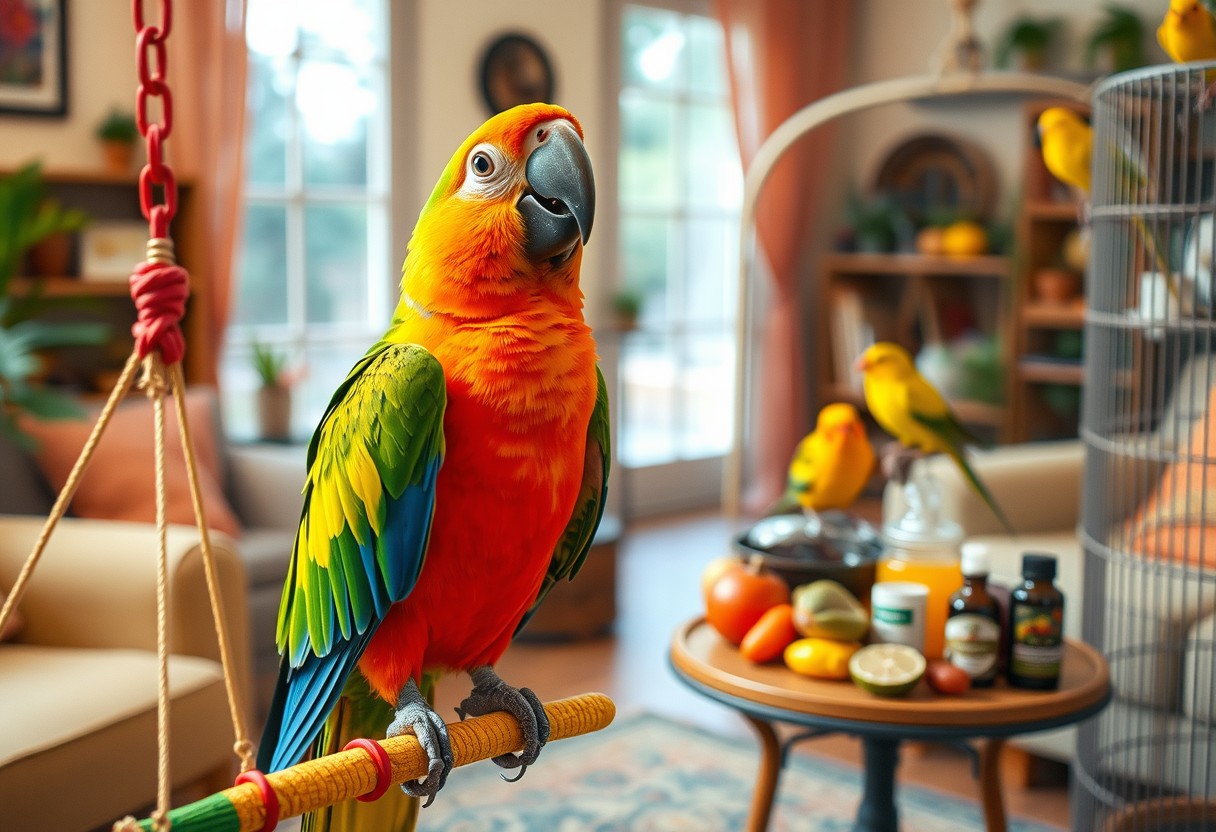
Addressing Digestive Problems
Once again, digestive problems in birds can be a significant issue that requires your attention. Common symptoms include changes in droppings, weight loss, vomiting, and lethargy. By recognizing these symptoms and acting swiftly, you can help your feathered friend regain their health. This chapter will explore several natural remedies, including herbal treatments and the use of probiotics, to effectively address your bird’s digestive troubles.
Herbal Treatments
The use of herbs as natural remedies for digestive problems in birds can be quite effective. Herbs such as peppermint, chamomile, and fennel have been known to soothe the digestive tract and promote better gastrointestinal health. Incorporating these herbs into your bird’s diet can help relieve symptoms of upset stomach, bloating, and gas. Just ensure that the herbs are safe for your specific bird species before introducing them into their diet.
Another beneficial herb is ginger, which has strong anti-inflammatory properties that can aid in the reduction of gastrointestinal issues. You can experiment by steeping a small amount of ginger in water and offering it to your bird, or you can find ginger-infused bird treats that are formulated for their digestive health. Remember to introduce any new herbal treatments gradually to avoid overwhelming your bird’s system.
Importance of Probiotics
Any owner of a pet bird should understand the crucial role that probiotics play in maintaining your bird’s digestive health. Probiotics help balance gut flora, which can be disrupted by stress, poor diet, or illness. By introducing live beneficial bacteria into your bird’s system, you can enhance nutrient absorption and boost their immune response. Probiotic supplements specifically designed for birds are available in various forms, such as powders or pellets, making it easy for you to add them to their diet.
Additionally, incorporating naturally fermented foods that contain probiotics can also be beneficial. For example, small amounts of unpasteurized yogurt or kefir can provide beneficial microorganisms to aid digestion. Always consult your veterinarian before introducing probiotics into your bird’s diet, especially if they are already facing digestive issues, to ensure you select the most appropriate option for their specific health needs.
A well-functioning digestive system is vital for the overall health and well-being of your bird. Providing natural remedies such as herbal treatments and probiotics not only helps address current digestive problems but can also prevent future issues. By actively maintaining your bird’s gastrointestinal health, you can ensure they live a happy and vibrant life.
Respiratory Health Solutions
All pet owners must be vigilant about their birds’ respiratory health as it can lead to serious health issues if not addressed in time. Respiratory problems in birds can result from various factors, such as environmental changes, infections, or poor air quality. Fortunately, natural remedies can alleviate these concerns and support your feathered friend’s breathing. Here, we explore effective herbal inhalants and necessary oils that can promote respiratory health in your birds.
Herbal Inhalants
An excellent way to enhance your bird’s respiratory health is by using herbal inhalants. These inhalants can provide soothing effects and act as natural decongestants. Herbs like eucalyptus and peppermint can help clear mucus and support lung function when introduced into your bird’s environment. You can create a simple herbal steam by adding a few drops of necessary oils or fresh herbs to hot water. Ensure that the steam is not too hot, and allow your bird to enjoy the aromatic and therapeutic benefits from a safe distance.
Another option is to prepare a herbal infusion using safe herbs. Place herbs like thyme or chamomile in hot water, allowing them to steep. Once cooled, you can place this infusion in a shallow dish and position it near your bird’s cage. This subtle method of inhalation can help your bird breathe easier and feel more relaxed, especially if they are experiencing any respiratory distress.
Essential Oils for Respiratory Care
Herbal solutions are not the only option you can consider for respiratory health; necessary oils also play a vital role in supporting your bird’s respiratory system. Oils like eucalyptus, lavender, and tea tree possess antibacterial and anti-inflammatory properties, making them effective in clearing airways and promoting respiratory functions. However, it is crucial to use these oils with caution and always dilute them appropriately; birds are more sensitive to necessary oils than humans.
The incorporation of necessary oils in your bird’s environment can enhance their overall respiratory condition. You could use a diffuser to disperse necessary oils throughout your home or directly sprinkle a few drops onto a cotton ball, placing it in an area away from your bird yet still allowing it to benefit from the aroma. Note, always monitor your bird for any signs of adverse reactions, as some birds may be sensitive to particular oils, and consult a veterinarian before introducing any new treatment to ensure safety and effectiveness. Your bird’s health is paramount, and employing these natural remedies with care can yield positive results.
Summing up
With this in mind, it’s crucial to recognize that keeping your birds healthy can often be supported by natural remedies that are both effective and safe. By incorporating simple dietary changes, herbal supplements, and maintaining proper hygiene, you can significantly enhance your avian companions’ well-being. Always remember to observe your birds closely for any signs of distress and to consult with a veterinarian specializing in avian health if issues persist. Your proactive measures in utilizing natural remedies can lead to a vibrant and thriving feathered family.
Ultimately, understanding the common health issues faced by birds allows you to take preemptive steps to mitigate these concerns. Whether you’re dealing with respiratory problems, digestive troubles, or skin conditions, there are numerous natural solutions at your disposal. By empowering yourself with knowledge and integrating these remedies into your bird care routine, you ensure a healthier, happier environment for your cherished pets. Your commitment to their health not only enriches their lives but fosters a deeper bond between you and your birds.
FAQ
Q: What are some common health issues in birds, and how can they be treated naturally?
A: Common health issues in birds include respiratory infections, feather plucking, and digestive problems. Natural remedies can be beneficial in managing these conditions. For respiratory issues, steam inhalation with eucalyptus or adding thyme to their environment can help clear nasal passages. For feather plucking, providing a nutrient-rich diet that includes natural supplements such as flaxseed oil can improve feather condition and reduce stress. For digestive problems, probiotics and a balanced diet with fresh fruits and vegetables can promote healthy gut flora and improve digestion.
Q: How can I prevent common bird health issues with natural methods?
A: Prevention is key to avoiding health issues in birds. To ensure overall wellness, maintain a clean living environment by regularly cleaning cages and toys, which helps prevent the spread of germs. Providing a varied diet that includes high-quality pellets, seeds, and plenty of fresh fruits and vegetables is important for preventing nutritional deficiencies. Additionally, incorporating natural stress-relievers like toys that promote mental stimulation and social interaction can help reduce the likelihood of behavioral issues, such as feather plucking.
Q: Are there any specific herbs or supplements that can support bird health?
A: Yes, several herbs and natural supplements can support bird health. Herbs such as dandelion, chamomile, and basil can provide various health benefits, including aiding digestion and reducing inflammation. Milk thistle is often used for liver support, while turmeric can be an anti-inflammatory agent. Additionally, incorporating omega-3 fatty acids from sources like flaxseed or chia seeds can promote healthy feathers and skin. Always consult with a veterinarian before introducing new herbs or supplements to ensure they are safe for your specific bird species.
